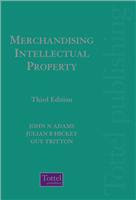Merchandising is back!
 The third edition of Merchandising Intellectual Property, by John Adams, Julian B. Hickey and Guy Tritton, has come out so long after the second issue that it has largely slipped from the IP practitioner's consciousness. That it is revived, as a slimmer book but a very much more punchy one, is to the credit of its publisher, Tottel. That it has also changed its title, from Character Merchandising, leads the IPKat to surmise that it is not really a third edition of the old book at all, but the first edition of a very new and highly welcome one.
The third edition of Merchandising Intellectual Property, by John Adams, Julian B. Hickey and Guy Tritton, has come out so long after the second issue that it has largely slipped from the IP practitioner's consciousness. That it is revived, as a slimmer book but a very much more punchy one, is to the credit of its publisher, Tottel. That it has also changed its title, from Character Merchandising, leads the IPKat to surmise that it is not really a third edition of the old book at all, but the first edition of a very new and highly welcome one.The authors are a triumvirate consisting of an academic (though with strongly practical fringes), a solicitor and a barrister. With lawyerly triumphalism the IPKat expresses his pleasure that the team doesn't include an accountant. Worthy and necessary as they are, accountants don't make law books much fun.
What the publisher says:
"... this is the only book available that deals with the particular problems which arise in relation to merchandising in the UK. Examining important issues to be considered by the owners and the licensee, it offers information in a concise and readily accessible format and includes invaluable precedents such as licensing agreements, cross-border licences and a representation agreement. Covering the UK plus 5 key international jurisdictions: Australia; Canada; France; Germany; and USA, this new edition has been brought right up-to-date and includes updated coverage of trade marks law (including Arsenal v Reed), revised content to take account of the Act 1998, and changes to copyright law, in the US in particular".
 What the IPKat says:
What the IPKat says: Having recently undergone a bout of academic reading, it was a pleasure to read a law book that is designed to help and guide readers, clearly and confidently, through the law rather than to demonstrate how clever the authors are - but their cleverness lies in the fact that they have succeeded in doing so. And there's much for the IP enthusiast to delight in here. The tabular schema for working out when copyright expires in different types of merchandisable right is not only useful but enables the reader to create his own little sudokus, as it were, by thinking up merchandisable propositions and then trying to calculate the dates on which different bits of them fall out of protection. There's also an engagingly focused review of the Appointed Person's decision in the Linkin Park case (see IPKat post here) that suggests, ever so slightly, that the authors are not entirely content with it. If you can't steal it (and £168 suggests that someone is stealing something from someone), buy it!Bibliographic details. ISBNs 978 184592 238 2 and 1845922387/9781845922382. Price £168. Hardback, xxxi + 287 pages. Rupture factor: not critical. Details from publisher's website here
